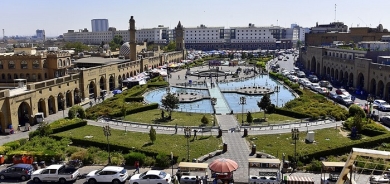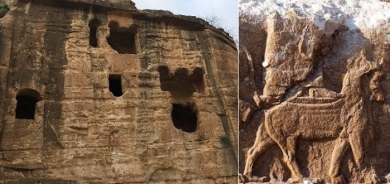U.S. signals possibility of arming Syrian opposition as crackdown leaves more deaths

The comments, made by officials at both the White House and the U.S. State Department on Tuesday, marked a shift in emphasis by Washington, which so far has stressed a policy of not arming the opposition and has said little about alternatives.
The U.S. comments came as Tuesday’s death toll hit 106 people, who were shot dead by the fire of Syrian security forces, Al Arabiya reported, citing Syrian activists.
The deaths took place within two massacres; the first was in Idlib, where as many as 55 people were killed, while the second was reported in Baba Amro in the city of Homs, where 49 people were killed, activists at the Syrian Revolution Commission told Al Arabiya. The death included 10 children and 3 women.
In the besieged Baba Amro neighborhood, which has been under the Syrian forces’ shelling for the past 18 days, a prominent activist and photographer was shot dead on Tuesday, Al Arabiya reported.
Baba Amro photographer killed
Ramy al-Sayyed, who was credited for circulating the video footages showing the massacres taking place in Baba Amro by the Syrian forces to TV channels along the past months, was killed while trying to shoot one of those videos.
“What is happening in Baba Amro is mass killing. I reject when people sympathize with us by saying ‘we are supporting you with our hearts’. What is needed is for people to protest in front of embassies,” Ramy said minutes before he was shot dead, his companions told Al Arabiya.
The Red Cross called for daily ceasefires to allow in urgently needed aid.
“We still believe that a political solution is what’s needed in Syria,” White House spokesman Jay Carney said.
“We don’t want to take actions that would contribute to the further militarization of Syria, because that could take the country down a dangerous path. But we don't rule out additional measures.”
Asked if the United States was shifting its stance on arming the rebels, U.S. State Department spokeswoman Victoria Nuland said Washington did not want to see the violence increase and was concentrating on political efforts to halt the bloodshed, according to Reuters.
“That said ... if we can't get Assad to yield to the pressure that we are all bringing to bear, we may have to consider additional measures,” she said, declining to elaborate.
The official comments on Tuesday followed a cautious assessment from General Martin Dempsey, chairman of the U.S. military’s Joint Chiefs of Staff, who told CNN over the weekend that Washington still did not know enough about Assad's opponents.
“Until we're a lot clearer about who they are and what they are, I think it would be premature to talk about arming them,” Dempsey said.
Friends of Syria
U.S. Secretary of State Hillary Clinton will meet representatives of some 70 countries in Tunis on Friday for the first “Friends of Syria” meeting to coordinate the international community's next steps in response to the nearly year-long uprising against Assad.
The trip is “part of our ongoing efforts with our friends, allies and the Syrian opposition to crystallize next steps to halt the slaughter of the Syrian people and pursue a transition to democracy in Syria,” the State Department said in a statement, according to AFP.
The United States and its allies hope the Tunis conference will allow them to begin drawing up a plan for Syria after Russia and China vetoed a Western-backed Arab League peace plan at the U.N. Security Council.
With both Russia and Iran firmly backing Assad’s government, political analysts say tacit U.S. support for arming rebel fighters could be risky given Syria's complex ethnic and religious make-up and strategically important position.
“Force employed by the Friends of Syria should be the last step of an escalatory ladder,” Robert Danin, a Middle East expert at the Council on Foreign Relations, wrote in an opinion piece on Tuesday.
“Arming the Free Syrian Army and other opposition groups may eventually help topple Assad, but it also increases the potential for a fractured or failed state.”
A Syrian opposition figure who managed to get into Homs appealed for international help.
“The sound of bombardment and sniper fire are echoing across the city,” Moulham al-Jundi, a member of the Syrian National Council, told Reuters from Homs.
“The army prevents first aid or medical supplies from going in and electricity is cut off 15 hours a day. There has been no mobile phone service for three weeks,” said Jundi, who lives in exile in Saudi Arabia and was smuggled into Homs.
“Civilians need safe zones and a way has to be found to ensure that medicine and basic supplies reach Homs. There are no hospitals, no schools, no work, no government departments open and most shops are shut.”
Opposition to meet Red Cross officials
A delegation from the Syrian National Council, the main Syrian opposition grouping, is due to meet Red Cross officials in Geneva on Wednesday.
Since Feb. 11, Red Crescent and ICRC teams have managed to enter the cities of Homs, Bludan, al-Zabadani and Madaya to provide humanitarian relief, according to AFP.
Rights groups say more than 6,000 people have been killed in the regime’s crackdown which began in March last year.
Activists’ accounts of the violence could not be independently verified. The government bars most foreign journalists from Syria.
Official media said government forces were targeting “armed terrorist groups who have been terrifying citizens and attacking security forces and robbing public and private property.”
The Alawite minority, an offshoot of Shiite Islam, have dominated Sunni majority Syria for the last five decades. Under Assad, who is an Alawite, members of his clan have extended their control on key sectors of the economy, such as oil, telecom and state procurement.
After months of a military crackdown, armed opposition to Assad has emerged along with street demonstrations, especially in the suburbs of Damascus and the provinces of Homs and Aleppo, all joined by the main highway connecting the north of the country to its south.
Anti-Assad protests have also hit the capital over the past week, undermining Assad's assertion that the uprising against his rule is limited to the provinces and is the work of saboteurs.
(Reuters)














